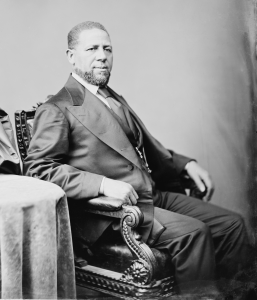1 More Civil War Statue for Forgotten Hero
Mississippi should commission the creation of a new statue to recognize a real state hero, Hiram Robles Revels, to be placed in the National Statuary Hall as the first black U.S. senator to serve.
February 22, 2018 at 03:32 PM
6 minute read

There is a movement in the United States to tear down Southern Civil War statues, particularly those honoring Robert E. Lee and Jefferson Davis. Those statues were erected with no acknowledgment of the reason for the Civil War, which was to end the horrible practice of slavery. Removing those statues doesn't do anything to recognize the black leaders who stepped forward during the Reconstruction era to work for a free and open society in the South. One such leader was Hiram Rhodes Revels.
During Reconstruction most black men in the South were Republican. Revels was a college-educated minster in the African Methodist Church. During the Civil War he helped organize two regiments of U.S. colored troops (as they were then called), served as a chaplain for black troops fighting in the Union Army, and took part in the Battle of Vicksburg. During Reconstruction he was elected an alderman in Natchez in 1868. In 1869 he was elected a state senator. In 1870 the Republican-controlled Mississippi Legislature elected Revels as a U.S. senator to fill the vacant seat once held by Jefferson Davis before he resigned from the U.S. Senate to lead the South in the Civil War.
Under the terms of Reconstruction set by the Union, each Confederate state had to draft a new constitution and reapply for admission. On Feb. 23, 1870, President Ulysses S. Grant approved the readmission of Mississippi into the Union, and the Republicans in the U.S. Senate immediately moved to have Revels sworn in.
On Friday, Feb. 25, 1870, the Senate debated Revels' admission to the Senate. The Democratic senators sought to block his seating, arguing that under the Dred Scott decision black men were not citizens of the United States, and weren't until the 14th Amendment made them citizens. Even though Revels was never a slave and had been born a free man, they argued that the U.S. Supreme Court had determined that the Constitution didn't recognize a black man as a U.S. citizen. Further, they argued that even if the 14th Amendment allowed black men to be U.S. citizens, the Constitution required a senator to have been a citizen for nine years before being elected, and it hadn't been nine years since the passage of the amendment, and thus Revels still wasn't eligible to be a U.S. senator. One Republican senator mocked the Democrats as still fighting the last battle of the Civil War that they had lost. Fortunately, Republicans had the majority and on Feb. 25, 1870, on a party line vote of 48-8, Hiram Rhodes Revels became Sen. Hiram Rhodes Revels, the first black man to be a member of the U.S. Congress. The debate had taken place before a packed gallery and for the swearing in that immediately followed, everyone rose in silence in a stunning tribute to Revels.
As a senator, Revels advocated compromise and moderation. Much of the Senate's attention focused on Reconstruction issues. When radical Republicans called for continued punishment of ex-Confederates, Revels argued for amnesty and a restoration of full citizenship, provided only that a sworn oath of loyalty to the United States be given. He quietly and persistently worked for equality. He spoke against the segregation of the D.C. school system, he nominated a young black man to the U.S. Military Academy, he championed the cause of black workers who had been barred by their color from working in the Washington Navy Yard. Further, he supported bills to develop the infrastructure in Mississippi, including the construction of new railroads.
In the Reconstruction era only two other black U.S. senators were elected: one from Mississippi, Blanche Bruce, and the other from Louisiana, P.B.S. Pinchback. None of the three were re-elected. However, it was not because of their performance in office but because there was a change in the control of the legislatures in their home states, from Republican control to Democratic control. All three senators were Republican, and with the retirement of Bruce in 1881, there was not another black senator elected until Republican Edward Brooke from Massachusetts, in 1967, almost a century later.
After his term of office in the U.S. Senate, Revels was appointed as the first president of Mississippi's Alcorn Agricultural and Mechanical College. In 1875 he gained national attention by writing an open letter to Grant that was widely reprinted. In the letter he denounced Gov. Adelbert Ames of Mississippi and the “carpetbaggers” for manipulating the black vote for personal benefits, and for keeping alive wartime hatreds. He wrote in part, “the bitterness and hate created by the late civil strife has, in my opinion, been obliterated in this state, except perhaps in some localities, and would have long since been entirely obliterated, were not for some unprincipled men who would keep alive the bitterness of the past, and inculcate a hatred between the races, in order that they may aggrandize themselves by office and its emoluments to control my people, the effect of which is to degrade them.”
In Washington, D.C., the National Statuary Hall in the Capitol lets each state place two statues representing prominent historical citizens of the state. Mississippi's statues are of Jefferson Davis, the president of the Confederacy and a racist traitor to his country. The other is of James Z. George, who followed Bruce as a U.S. senator from Mississippi from 1881 to 1897. George was a member of the Mississippi Secession Convention, a signer of the Ordinance of Secession and a Confederate colonel of the Fifth Mississippi Cavalry during the Civil War. He was captured twice and spent two years as a prisoner of war.
Mississippi should commission the creation of a new statue to recognize a real state hero, Hiram Robles Revels, to be placed in the National Statuary Hall where he was the first black U.S. senator to serve. One of Mississippi's other statues could be removed.
This content has been archived. It is available through our partners, LexisNexis® and Bloomberg Law.
To view this content, please continue to their sites.
Not a Lexis Subscriber?
Subscribe Now
Not a Bloomberg Law Subscriber?
Subscribe Now
NOT FOR REPRINT
© 2025 ALM Global, LLC, All Rights Reserved. Request academic re-use from www.copyright.com. All other uses, submit a request to [email protected]. For more information visit Asset & Logo Licensing.
You Might Like
View All
The Stormy Daniels 'Hush Money' Trial: Donald Trump Should Be Very Worried
7 minute read
Shining a Light on Opposing Hate: The Palestinian Protesters Who Defended New Haven's Menorah
6 minute readTrending Stories
- 1We the People?
- 2New York-Based Skadden Team Joins White & Case Group in Mexico City for Citigroup Demerger
- 3No Two Wildfires Alike: Lawyers Take Different Legal Strategies in California
- 4Poop-Themed Dog Toy OK as Parody, but Still Tarnished Jack Daniel’s Brand, Court Says
- 5Meet the New President of NY's Association of Trial Court Jurists
Who Got The Work
J. Brugh Lower of Gibbons has entered an appearance for industrial equipment supplier Devco Corporation in a pending trademark infringement lawsuit. The suit, accusing the defendant of selling knock-off Graco products, was filed Dec. 18 in New Jersey District Court by Rivkin Radler on behalf of Graco Inc. and Graco Minnesota. The case, assigned to U.S. District Judge Zahid N. Quraishi, is 3:24-cv-11294, Graco Inc. et al v. Devco Corporation.
Who Got The Work
Rebecca Maller-Stein and Kent A. Yalowitz of Arnold & Porter Kaye Scholer have entered their appearances for Hanaco Venture Capital and its executives, Lior Prosor and David Frankel, in a pending securities lawsuit. The action, filed on Dec. 24 in New York Southern District Court by Zell, Aron & Co. on behalf of Goldeneye Advisors, accuses the defendants of negligently and fraudulently managing the plaintiff's $1 million investment. The case, assigned to U.S. District Judge Vernon S. Broderick, is 1:24-cv-09918, Goldeneye Advisors, LLC v. Hanaco Venture Capital, Ltd. et al.
Who Got The Work
Attorneys from A&O Shearman has stepped in as defense counsel for Toronto-Dominion Bank and other defendants in a pending securities class action. The suit, filed Dec. 11 in New York Southern District Court by Bleichmar Fonti & Auld, accuses the defendants of concealing the bank's 'pervasive' deficiencies in regards to its compliance with the Bank Secrecy Act and the quality of its anti-money laundering controls. The case, assigned to U.S. District Judge Arun Subramanian, is 1:24-cv-09445, Gonzalez v. The Toronto-Dominion Bank et al.
Who Got The Work
Crown Castle International, a Pennsylvania company providing shared communications infrastructure, has turned to Luke D. Wolf of Gordon Rees Scully Mansukhani to fend off a pending breach-of-contract lawsuit. The court action, filed Nov. 25 in Michigan Eastern District Court by Hooper Hathaway PC on behalf of The Town Residences LLC, accuses Crown Castle of failing to transfer approximately $30,000 in utility payments from T-Mobile in breach of a roof-top lease and assignment agreement. The case, assigned to U.S. District Judge Susan K. Declercq, is 2:24-cv-13131, The Town Residences LLC v. T-Mobile US, Inc. et al.
Who Got The Work
Wilfred P. Coronato and Daniel M. Schwartz of McCarter & English have stepped in as defense counsel to Electrolux Home Products Inc. in a pending product liability lawsuit. The court action, filed Nov. 26 in New York Eastern District Court by Poulos Lopiccolo PC and Nagel Rice LLP on behalf of David Stern, alleges that the defendant's refrigerators’ drawers and shelving repeatedly break and fall apart within months after purchase. The case, assigned to U.S. District Judge Joan M. Azrack, is 2:24-cv-08204, Stern v. Electrolux Home Products, Inc.
Featured Firms
Law Offices of Gary Martin Hays & Associates, P.C.
(470) 294-1674
Law Offices of Mark E. Salomone
(857) 444-6468
Smith & Hassler
(713) 739-1250












